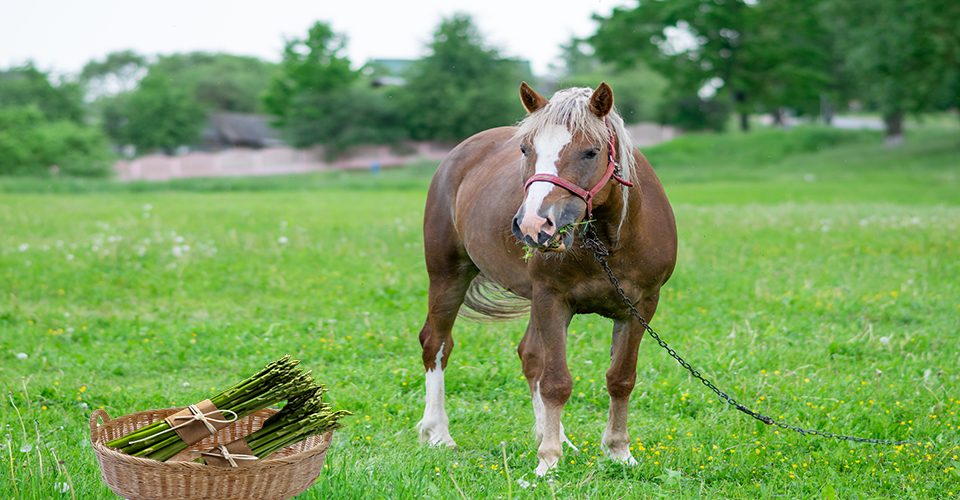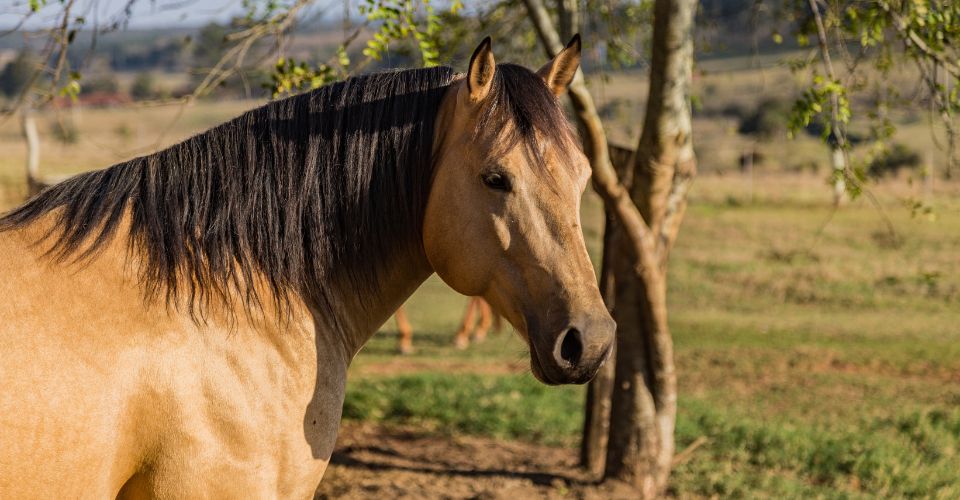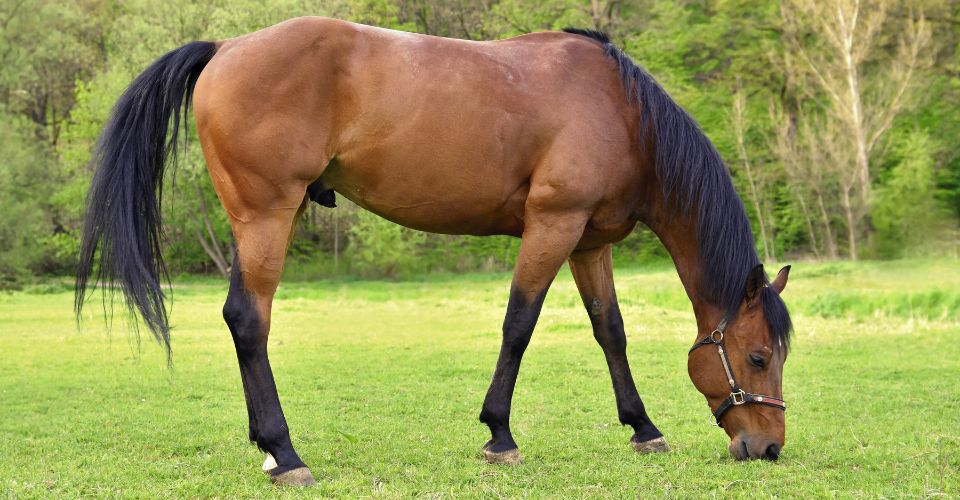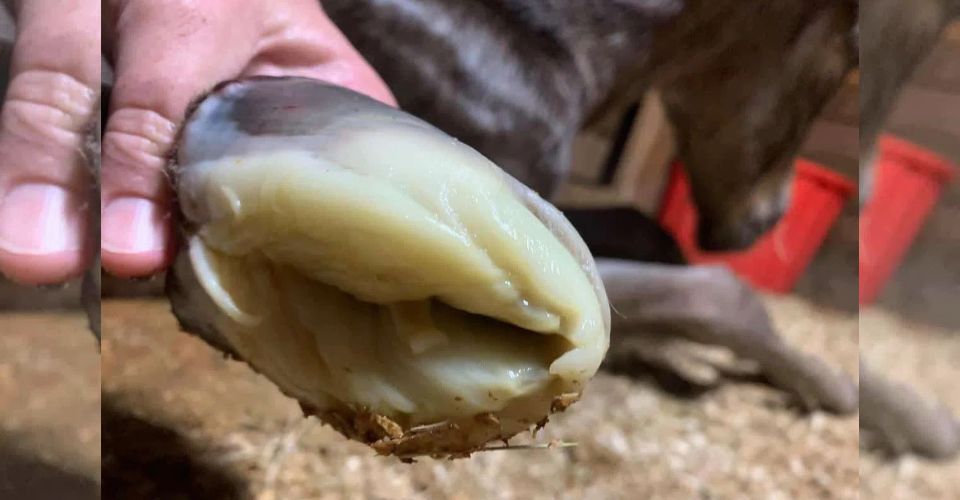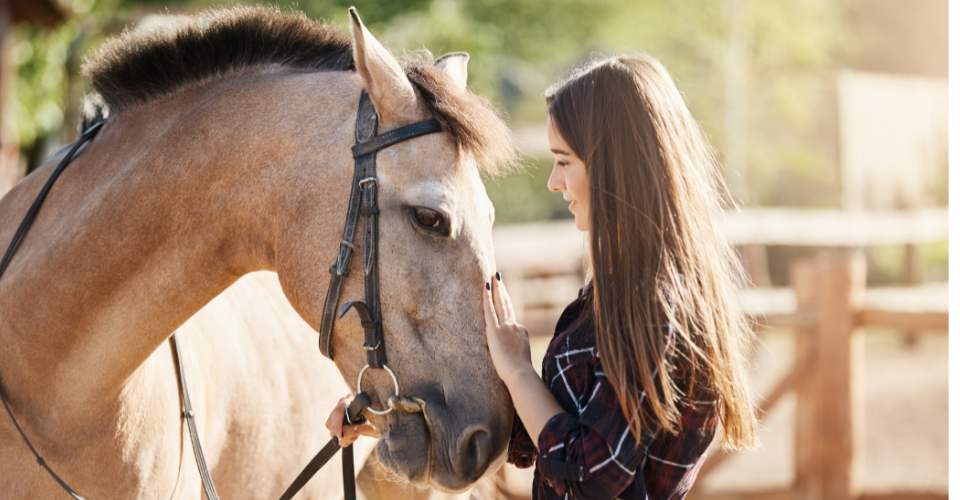Asparagus has been a long-loved veggie: it is depicted on an ancient Egyptian frieze, it was enjoyed by both ancient Greeks and Romans, and Germany has an entire day – Spargelzeit – celebrated on June 24, dedicated to asparagus.
Perhaps you are into this vegetable too, and it is, therefore, natural for you to think of letting your horse savor it too! But can horses eat asparagus? You might have heard the claims that asparagus belongs to the lily family, which contains onion and garlic – veggies that are not recommended for equines. However, there is no truth to such claims, and asparagus is fine for equine consumption. But as another side of the coin, it comes with some risks too.
Keep reading to find an all-inclusive guide to horses eating asparagus.
Asparagus Grows Fast!
Because of its growth speed, you can literally see asparagus growing. It grows about seven inches every day.
Can Horses Eat Asparagus?
Yes – horses can eat asparagus. In general, due to various beneficial nutrients, asparagus is a healthy snack for your horse unless no overindulgence occurs. This vegetable should be, thus, fed only in small quantities as if it is a treat or reward because of the digestive issues and stinky urine that may result in case of excessive consumption. With that said, let us gallop into the details.
Do Horses Like Asparagus?
Just like us, horses are also into asparagus. Being a green, crunchy vegetable, asparagus is a resounding yes to equine taste buds. Naturally inclined toward eating green and fresh veggies, horses generally do not hesitate to have asparagus. However, they might not like the effort needed to chew at it because of its hardness. Conversely, when served properly, horses eat it happily. The way of correct serving will be discussed shortly.
Benefits of Horses Eating Asparagus
Asparagus is, indeed, a great addition to your steed’s diet – thanks to the amazing nutritional value it offers. However, note that the nutrition varies slightly between the white and green variants of asparagus: the former is a bit lower in antioxidants while the latter offers a higher quantity of proteins, calcium, ascorbic acid, thiamin, and niacin.
In general, the following nutrients are present in asparagus along with their beneficial effects on horses:
Antioxidants
Antioxidants protect horses from free radical damage and keep certain diseases at bay. For instance, flavonoids are advantageous to horses in many ways, such as providing anti-inflammatory effects and protecting cells from oxidative damages that may lead to certain diseases. Likewise, polyphenols are known for slowing down the aging process in horses in addition to acting against certain chronic issues that may pop up with aging.
Fibers
Asparagus contains both soluble and insoluble fiber types; nonetheless, the latter is much higher than the former. Fibers help a lot in digesting several grains, and it boosts energy to tackle bacterial fermentation in the hindgut.
The insoluble type makes the stool bulkier and regulates bowel movement. On the other hand, the soluble type can contribute to higher energy levels, as per a 2016 study.
Minerals
Asparagus contains numerous minerals that enhance horses’ performance on the race track.
- Calcium: It is vital for maintaining the structural integrity of horses. It is also important for muscle contractions.
- Copper: It supports the proper functioning of several enzymes in horses.
- Iron: It is important for oxygen transportation in the body.
- Phosphorus: Like calcium, phosphorus is necessary for skeletal and bone health.
- Potassium: It works as an electrolyte for the proper working of muscles.
Vitamins
Plenty of vitamins are present in asparagus that keep the overall health of your horse intact.
- Vitamin A: It supports better immunity, vision, and reproductive health.
- Vitamin B9: It helps in metabolism, digestion, and DNA repair.
- Vitamin C: It is important for a healthy immune system.
- Vitamin E: It is vital for the normal functioning of the nerve and muscle systems.
- Vitamin K: It helps in blood clotting.
Potential Risks of Horses Eating Asparagus
Asparagus is, fortunately, overall safe for horses, and there is nothing toxic in it. The problems it may create are of pure mechanical nature, and its composition is not damaging to your steed’s well-being. There are two main risks associated with horses eating asparagus:
Indigestion
As already discussed, asparagus is rich in fiber. Where it offers numerous benefits, it has its downsides as well, and the top among those are indigestion and hardness. Consequently, horses may find it difficult to chew and process asparagus in their stomachs, which may lead to an upset stomach, and your steed may experience diarrhea and abdominal pain. Additionally, asparagus may also hurt the jaw health of your horse if fed in excess. The eventual jaw spasm can ultimately impact his eating habits, putting him at risk of malnutrition.
Asparagus Pee
Asparagus Pee does not only affect horses – it happens to all creatures who have this vegetable. During digestion, asparagusic acid in asparagus is broken down into byproducts containing sulfur, a well-known element for its ‘bad’ smell. These byproducts make their way into horses’ urine, and when your equine friend pees, the byproducts evaporate almost immediately, giving off a foul smell.
How to Safely Feed Asparagus to Your Horse?
The key point to remember is to avoid raw asparagus because of its hardness. To get rid of it, you must cook the asparagus first to the point that it becomes chewy and soft. You can use various methods to do so, such as boiling, baking, or steaming. To make it further easy to chew and digest, cut it into small pieces after it cools down.
Wash It!
Before you prepare asparagus or any other food item for your horse, you should thoroughly wash it to get rid of any potential pesticides and insecticides.
To add to the taste, you can serve asparagus to your horse by adding different horse-safe veggies and fruits to it. Doing so can also provide him the nutrients asparagus is void of.
Do Not Overcook Asparagus!
Cooking veggies for too long can lead to the loss of nutrients in veggies. To make sure that the asparagus your steed eats is beneficial for him, take it off the stove as soon as it loses its hardness.
What to Do if Your Horse Goes Unwell After Eating Asparagus?
Stop feeding your horse asparagus right away when your horse shows any signs of sickness after consuming asparagus. To avoid any bad experience, it is recommended that you introduce new vegetables, including asparagus, to horses slowly and gradually: start with a small amount and then wait to see if any side effects pop up before increasing the quantity. Nonetheless, even during this testing phase, you should remain cautious, and if anything seems off with your equine, contact a vet as soon as possible to prevent your equine’s health from deteriorating.
Alternatives to Asparagus for Your Horse
If you do not feel good about your horse having asparagus, luckily, there are many safe and healthy alternatives. Nevertheless, always be mindful that moderation is the key, and excess of everything is bad, and you should never makes fruits and veggies an integral part of your horse’s routine diet.
- Broccoli: Cooked and no more than five ounces of broccoli is safe for equine consumption.
- Cucumber: Horses can eat cucumber, but it should be fed with caution in moderate amounts.
- Celery: Horses enjoy celery, and a bite or two of it does not hurt their health.
- Green Beans: Horses love green beans as an occasional treat. However, only the organically grown vegetable must be fed to avoid pesticide toxicity.
- Green Peas: Green peas make a great snack for horses.
- Lettuce: Lettuce is safe for horse consumption, but it is not the most nutritious item, though you may find your steed loving it.
- Spinach: Horses can safely have spinach if fed occasionally.
- Zucchini: It is safe and beneficial for the overall health of horses.
- Strawberries: Horses love strawberries, but you shouldn’t feed them more than 2 per day and 10 a week.
- Blueberries: Besides being safe for horses, blueberries have to offer a lot of health benefits to equines.
Conclusion: Can Horses Eat Asparagus?
Yes, absolutely.
Horses can eat asparagus but only in a moderate amount. Eating in excess can upset your steed’s stomach leading to diarrhea, abdominal pain, and foul-smelling pee. On the other hand, when consumed occasionally as a treat, it would improve the overall health of your steed and make him perform better on the racetrack. So cut into small pieces and cooked to a certain level (soft), asparagus would make a great treat for your equine friend.
As told in the beginning, the lily family vegetables are not recommended for equine consumption. Learn can horses eat potatoes – a vegetable from the nightshade family.

